Get posts by email
An Emerging High Schooler, Interest-led, Learner-Specific Homeschool Curriculum
October 15, 2012
Oh my word. That's a mouthful of a title.
I originally started this post as an overview of all three of our kids' homeschool curriculum. Yikes. If I had continued down that track it would never have seen the light of day. So I decided to limit this to Céline's current curriculum only.
As it is, with my sometimes flighty writing habits, "oh look, something shiny", I had to discipline myself to finish writing this. I was distracted by oh so many nice writing ideas and you'll notice the blog was pretty quiet last week. This post is why. It's a tome.
I think a lot of FIMBY readers will find this interesting because Céline is definitely out of the elementary years and we all wonder (at least I did), "what does homeschooling look like as kids get older?" Well, I'm going to share with you what it looks like in our home, for one of our children.
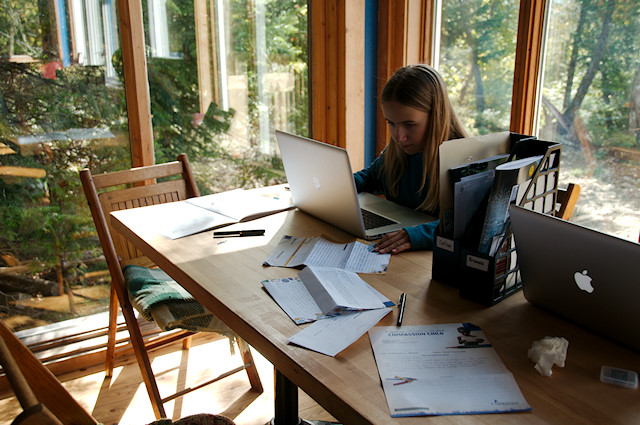
Just a quick note on that. This is what works for us, given our family culture, long term homeschool vision, Céline's unique interests and strengths. This is Céline's curriculum, tailored for her needs within the context of our family life. Your middle schooler/emerging high schooler curriculum will look different.
And just like everything we do, this curriculum is a living work in progress. The plan, the curriculum, the resources - they serve our needs. Not the other way around. We are continually tweaking and adapting.
Our two youngest are in the late elementary years and on a very similar track (with lots of room for individual interests) in terms of developmental growth. Céline is in a different stage all together. Even so, there is a lot of cross over and shared learning in our home. How can there not be? Learning, especially in a non-competitive homeschool environment is a collaborative, shared experience.
There's a lot in this post. And reading posts like this on other blogs can scare me. I get overwhelmed thinking about all the things different families appear to do. So before you get that way reading mine, let me say this: This is an overview of all the pieces to Céline's homeschool puzzle. And the puzzle gets put together slowly over time.
There are many elements to this curriculum, because it's a complete course of study. We don't do those elements every day or even every week. So don't panic. Our home is pretty laid back and a visitor might even ask, "when do you guys actually home 'school'?" Trust me, the pieces of the puzzle I discuss in this post are not as overwhelming as they look at first glance.
All that to say there's a lot in this post. A lot of resources and links. I hope this will help you in your own homeschool journey. But please take it for what it is - our journey.
Definitions
Curriculum
I define curriculum as a course of study. See this post for more on that. For the purposes of this post I am talking about curriculum in broadest terms - the complete course of study for the term or entire year. I will not be going into too much specifics but instead giving an overview.
Term
I plan our homeschool routine around three terms: Fall, Winter and Spring/Summer. We are currently in the fall term. The beginning of the fall term is when I do the majority of my planning for all three terms but everything is subject to change.
We'll start things this term that will carry over into the next and other items we'll drop all together when we realize they aren't a good fit for us. Other learning activities, like Math, will continue regardless of the term - the thing that might change is the method of teaching.
I have certain goals for each term but mostly the time frames are fluid and simply serve as a framework for when I re-evaluate our resources and progress.
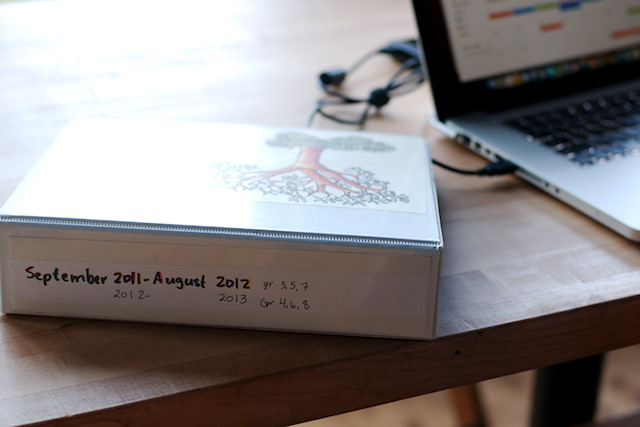
Bible
Bible is a subject that has always caused me a bit of concern about how best to teach something so foundational (for our family, at least). I do not want to assign Bible reading to my children. I'd like to say I model and inspire daily Bible reading but I fall short in that regard. Neither am I a "devotional" reader so I've never done that with the kids.
The main way I plan to work this into Céline's studies this fall is in conjunction with history, which I'll explain in that section. We also listen to the Bible together as a family. And we are slowly working our way through the catechism in Truth & Grace Memory Book.
I really like the scope and sequence presented in Telling God's Story: A Parents' Guide to Teaching the Bible (Telling God's Story). The book provides a good framework for when to teach the different parts of the Bible and at what developmental stages.
Community & Character
Our character is formed in relationship with other people so I fit these two together since they seem to partner well. Community is an important value to our family. We teach this to our children by being involved ourselves in our community in areas of personal interest and community need. We encourage our children likewise. A big focus for our family this fall is meeting and making friends.
Design & Art
This has always been a hugely important area of study of our children, only when they were little it was called crafts! As Céline's interests broaden and as she tries new things her sewing gets set aside for a time and then she'll pick it back up when we wants. Design in general is an interest of Céline's and she explores this mostly through creating with her hands - sewing projects, clay and miniatures are her favorites.
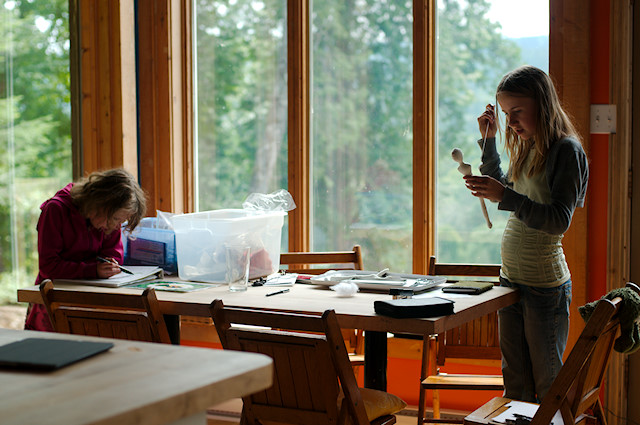
Entrepreneurship & Stewardship
Teaching our kids how to "earn a living" is important for us. Of course the best way to teach this is to model it and actively involve children in household and personal finances as they grow. We currently don't use any particular resources for this other than life itself. As Céline grows I'd like to look into Dave Ramsey's homeschool course.
Céline also has a growing business of sewing and art commissions. She has more requests than she has time or interest to do. She learns entrepreneurship and stewardship (wise management of her money) through actually earning and managing her own money.
French
Studying a second language gains importance as you approach the high school years, especially for kids who are planning post-secondary studies. I have no idea if Céline will go to university but our motivation for learning French is very simple. We live in French community and culture. We are motivated to learn so we can simply get along in our environment - which I think is the best motivation of all.
To this end Céline and I are exploring a couple options. We are starting with the free trial of Rocket French, to see if we'd like to continue with it. Otherwise, we are looking at Fluenz. The popular Rosetta Stone did not make the cut because of what our needs are - to learn the language to actually speak it, right now, tomorrow, when we go shopping, go to taekwondo etc. This is not an academic exercise for us, but a life skill.
Health & Wellness
Our family's core values, which include health and wellness, are taught mostly in the context of everyday living. Cooking and eating, outdoor play and exercise, and adequate rest - these are simply part of our life. And of course weekly hiking. Even so, we're tying in a few other pieces this term.
All the kids take Twaekwondo lessons, en Francais, twice a week. This works toward community building also and finding friends. We're also running races as a family (more community building) and as part of that Damien is doing endurance training with Céline based on the principles in The Big Book of Endurance Training and Racing. (Yes, Céline wants to do this and when she doesn't want to, she doesn't have to.) There is a lot of technical knowledge to this training, heart rate monitoring and such, that ties in with science.
History, Geography & Current Events
Céline is voracious reader and has read so many living books and historical fiction over the years that she has covered a lot of history, up to the 20th Century, already. We continue to use interest-led book choices as Céline's main history resource.
We tried a more structured history curriculum last winter term. That didn't go over so well. Honestly, Céline found it boring and not motivating. So we're back with what we know works for us - interest-led reading, supported with family discussion and other investigation (internet research, videos, mapping, further reading, hands-on experiences, etc.)
I use All Through The Ages: History Through Literature Guide to find titles that correspond with periods of history and geographical areas Céline is interested in learning about.
Since we have to beg, borrow and steal (and yes buy, English books) Céline's historical reading has slowed down somewhat (i.e.: we can't find most of what we need at the library) so I am supplementing this year with a few extra resources:
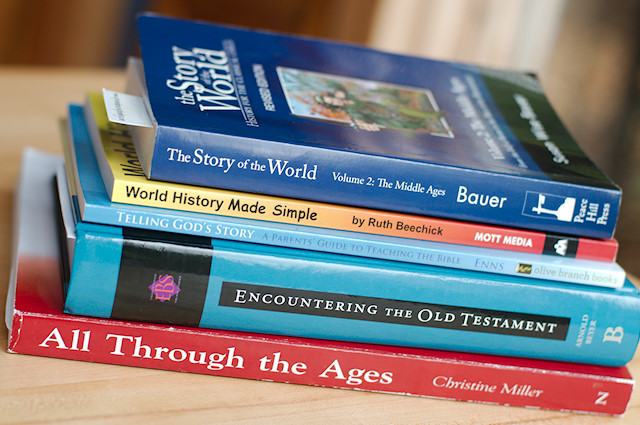
World History Made Simple: Matching History with the Bible. Like the title says, a simple view of history, from a Biblical worldview. I will be using Encountering the Old Testament: A Christian Survey as a teacher/facilitator reference. And Céline might read it if she's desperate enough for English reading materials!
Rounding that out we will be also using The Story of Science: Aristotle Leads the Way (and the following two books) - which is as much history as science, and is not written from a Biblical worldview. More on science later.
The Story of the World: History for the Classical Child: The Middle Ages: From the Fall of Rome to the Rise of the Renaissance - this is actually Laurent and Brienne's history resource but Céline is around often when we're reading from it and she adds her knowledge to whatever we're reading; teaching her siblings what she's already learned. She read the first three books from Story of the World series years ago and has studied the Middle Ages a lot in her own reading.
Geography is simply woven together with studying history. Sometimes we do specific "map work" - labeling and identifying, which the kids find fun since we don't do it all the time, but most often geography is learned in the context of life. We use our personal library of reference books, atlas, and of course the internet for geography studies.
For current events (geography and much more) I send Céline to Youngzine a couple times a week. She can read anything she wants there. It's totally safe and is a community of children and young adults. Youngzine is much more than current events and it's a great place to find safe, ad-free news for kids.
Looking ahead I anticipate in the coming years Céline will study 20th Century history much more in-depth. I have preferred to not burden my children with the wars of the last century and what I perceive as more young adult aged history studies. Also, sometime in the next couple years I want to do an in-depth Canadian history and geography study with all the kids, which we've never done.
Homemaking
Learning homemaking basics is one of the core competencies of our homeschool curriculum. This is mostly taught through everyday living and involving our kids in household chores and kitchen work.
This fall I am making a concerted effort to teach Céline how to cook a supper meal. My goal is for Céline to develop a repertoire of meals she knows how to make and can do so competently on her own. To this end, I am working Céline into the supper rotation once a week or every other week.

Literature
Most of Céline's reading is interest-led and covers a wide spectrum of learning disciplines. Reading has always been very important to Céline and the lack of easily obtainable books is one of the challenges we've encountered in moving to Québec. English books are hard to come by but we are doing our best with e-books and she is still thriving and finding other avenues of learning (i.e.: the computer).
Something new is that I have started assigning certain books for Céline to read. More suggestions really than assignments. If, after she's started the book, she's not interested in it, she doesn't have to finish the book. My goal is to read these books also and use these selections as a spring board for shared learning and discussion.
A recent book example is The Hiding Place by Corrie Ten Boom. This covers history, character, Bible, and so much more. I use Honey for a Teen's Heart and other "classic" reading lists to find titles.
In the winter term Céline will be starting an online girls book club that I am organizing right now with a friend. The goal is to enjoy reading together with other people, share and discuss ideas from that reading, and build friendships.

Math
The new thing for us this term is Khan Academy. Céline is finishing her current Math U See level and using Khan Academy to fill in the gaps before starting Pre-Algebra sometime next Winter or Spring/Summer.
In actual fact, Khan Academy allows the learner to jump around wherever they wish to go so Céline is not necessarily studying Math in a perfectly linear fashion. And this is a welcome change to our Math practice.
Khan Academy
I want to take a few moments to talk about this fabulous resource. Céline is using Khan for both her math and science studies right now. We both like it and it's a great fit for our family. Khan enables Céline to pursue self-directed interests while also measuring her progress and providing assessment tools for me, her coach. I do admit though that Céline tracks her progress more closely than I do.
Currently, I let Céline's interests guide her Khan studies, i.e.: I don't assign Khan Academy lessons. I do assign a certain amount of time, i.e.: Céline's math practice is to do 45 minutes of Math on Khan - on whatever interests her.
I will explain how we use Khan for science shortly.
Outdoors & Adventure
This is an important part of our curriculum, and is one of our family's core values. Right now Céline is not studying anything in this regard (one year she took Wilderness First Aid training with Damien at the local college).
This part of our children's curriculum ties in a lot with health and wellness but is broader than that because we are endeavoring specifically to teach our children a love of wild places and an openness to experiencing the outdoors and adventure.
We teach this mostly through example and our family life style. Our weekly hikes and regular backpacking are a part of this. So is where we live and the attention we pay to outdoors in our everyday living.
Science
I had thought I would write a whole post on this topic. That is not going to happen. I just don't have the time. So I'll attempt to condense it here.
We don't teach elementary science. Not because we don't value science - hardly! Damien is a civil engineer and computer programmer. The focus of my Education degree was biology. Science plays a huge part in how we understand the world and make the decisions we do (i.e.: why we eat mostly plants).
I just don't think you need to actively, with lesson plans and assignments, teach science principles to young children (unless you want to and they love it!). I think my young children would have loved more science instruction and parent-led experiments but I didn't have the time to do that.
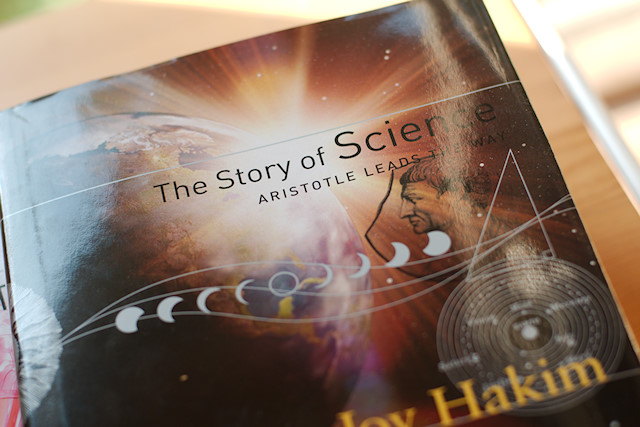
Our approach for the elementary years was to lay a foundation for future science study with hands-ons exploration, child-led experimenting, lots of reading, and asking questions.
Now it's time to take that deeper, but how?
I am not in favor of a textbook approach to science, unless our young adults are agreeable to that. I truly want to inspire our kids to want to study science. I'm figuring this out as I go.
What we're doing this term (and probably into next) is exploring the history of science and foundational scientific principles. We're using The Story of Science: Aristotle Leads the Way and if Céline likes this format we'll follow up with the other books in the series. (We only use the book you see pictured, not the teacher or student guide.)
We have discussions around these ideas and do follow up reading and instruction. I'd like to also bring in science biographies and stories. Finding science biographies that are both engaging and appropriate for young adults is a bit challenging. Recommends anyone?
We are using Khan Academy to help teach the scientific principles that arise from these studies. And Céline uses Khan independently to learn about whatever interests her.
Do you see where I'm going with this? Our goal is to inspire our young adults to study science. Because science is important for life and for future scholastic endeavors (i.e.: college). But we want them to want to study science. And then we pull in the teaching resources we need to teach the science they want learn.
Inspiration first. Studies second.
We may use a classic textbook approach to study high school level science (once the flame of inspiration has been lit), such as the popular and well recommended Christian resource Apologia. I am still looking at the options.
This term we are testing the scientific waters and seeing what interests Céline for future study.
Other sources of science inspiration:
- Books - You can see a few from our library below. The Janice Cleave books are elementary level science but are good introductions for any age.
- TED Talks
- Media in general, including YouTube
- Streaming public TV, eg. The Nature of Things (this is Canadian broadcasting, similar to BBC or PBS online in the UK and the US, respectively)
- Science Friday
- Youngzine
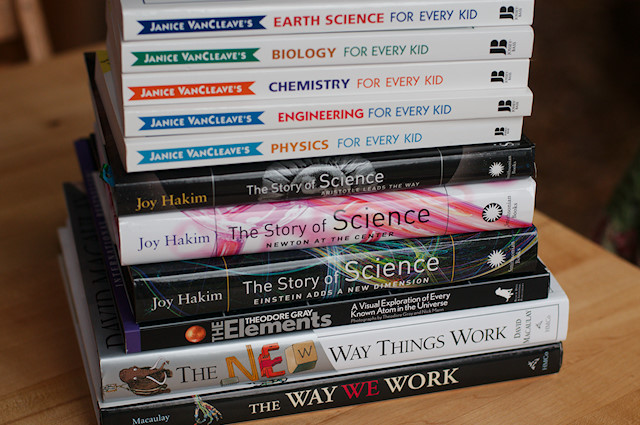
I know there is much more out there but this is sufficient for us for now.
These are only the resources I bring into the mix. Damien also adds a regular dose of science to our homeschool from his personal reading and interests. Everything from understanding heart rate, as it relates to physical activity (a current interest for Damien) to weird and wacky YouTube videos and all things techie. Damien adds a daily dose of science to our days.
Technology Literacy
This relates to science but is definitely distinct and on its own in our estimation. The way we see it - as workers in the knowledge and technology economy - understanding and using technology is the new literacy. We think being able to access and use technology will separate the haves from the have nots in the future, if this isn't true already. We live in an increasingly technologically complex world and we have to prepare our children for this reality.
Some people are technology generalists, simply because of how they are wired. Damien is like this. Other people use technology to support and develop their other intelligences. For example, our son plays around with a (challenging, though he doesn't know it) computer drawing program to expand his drawing skill and explore new artistic mediums.
This is a post about my emerging-high schooler so I'm not going to discuss technology for younger kids, except to say I believe early childhood should be rooted in nature and hands-on activities. However, I don't have a hard and fast philosophical stance against using technology in the earlier years, I just think you need to limit it.

We recently did a simple personality and intelligence test for each of our kids and not surprisingly this was included in Céline's assessment:
"Logical-mathematical learners like Céline quantify or conceptualize information in order to process it. These kids naturally excel in mathematics, chess, computer programming, reasoning capabilities, abstract patterns of recognition, scientific thinking and investigation, and the ability to perform complex calculations."
Damien and I had already come to this conclusion on our observations and introduced computer programming one year ago into Céline's curriculum. Céline worked on two different courses until she lost interest and Damien's schedule got too busy to be as involved as she needed. Speaking of that, Damien is responsible for this part of our childrens' learning. This is well outside of my areas of expertise or even interest.
This term we have no specific programming lessons. Céline got her own MacBook this fall and Damien has been teaching her networking and other stuff I have no clue about. All I know is that when I have a computer problem I now have two people in the house I can ask for help!
Damien will be starting Lego Robotics with all the kids in the winter term.
Our goal with technology literacy is that our children grow to be comfortable using technology (to not be afraid of change and new ideas) and know how to use specific technologies to their best advantage. This will be different for each of our children based on their unique intelligence and gifts.
(And that's my post on technology literacy wrapped up in this curriculum post.)
Writing
Writing has been one of the most challenging aspects of Céline's curriculum throughout her entire homeschooling "career". Céline is a naturally reticent person, and doesn't have a strong desire to express herself in writing and I believe in inspired and interest-led writing. So that puts the responsibility on me to inspire my daughter to writing vs. requiring her to sit down and learn grammar, spelling, etc. How do I teach these important skills? Through the inspired writing. How do I inspire my daughter to write? Well, that's what I'm trying to figure out!
I haven't worried a whole lot about this in her younger years because she has always been a competent reader with a vast vocabulary and I know it's all "in there". Céline has demonstrated she knows how a sentence should sound (grammar) and how words look (spelling).
She even has lovely handwriting from her early years handwriting practice. And now with a dedicated computer at her disposal, handwriting is totally optional. The knowledge and tools are all in place. I'm trying to piece it all together in a way that is naturally motivating for Céline.

This part of Céline's curriculum is very personal and individualized to Céline's personality and interests so I'm not going into great detail except to say I loosely follow the principles from the The Brave Writer resources, specifically The Writer's Jungle, as geared toward the Transition to Ownership phase of writing.
Another resource I use for inspiration is Patricia Zaballos' writing with kids.
I am considering an on-line Brave Writer course in the winter term to help kick start Céline's high school (gulp) writing instruction and experience.
~~~
I had hoped to include with this post:
- The schedule - how we structure our days, months and long term planning to meet our goals.
- Measuring progress, making evaluations and assessments.
I think I need to write a book.
We'll leave it at this for today.
I invite your comments, especially if you have resources and recommends for interest-led emerging high schooler resources! I am also available for coaching around your specific homeschooling concerns.
Follow-up
At our informal winter evaluation I asked Celine if she liked her curriculum. Read this post for her answer and what we did about it.
I have provided many links in this post, some of which are Amazon.com affiliates. Those links aren't very helpful for you if you're in Canada so I've included Canadian-based resources below. (you're welcome)
Canadian links:
- Truth & Grace Memory Book
-
Telling God's Story
- The Big Book of Endurance Training and Racing
- World History Made Simple: Matching History with the Bible
- Encountering the Old Testament: A Christian Survey
- Story Of The World #2 Middle Ages
- All Through The Ages: History through Literature Guide
- Story Of Science: Aristotle Leads The Way
- Honey For A Teen's Heart
Filed Under
Resource Library
-

Tanya on Oct. 15, 2012, 1:35 p.m.
Thank you for writing this. It's always interesting to see how other families do things. Sometimes I take away new ideas and things to try, other times I read and get a confirmations that we are on the right path for our family right now. I'd love to learn more about the personality testing you did with your children.
-

renee on Oct. 16, 2012, 10:58 a.m.
These are two personality/intelligence resources that I am familiar with and have used:
Nurture by Nature
Kidzmet online testing - this is combined personality and intelligence.
I would like to do more strength and intelligence "testing" with my kids. Here's another resource I would like to read: Your Child's Strengths: Discover Them, Develop Them, Use Them
-
-

Stephanie on Oct. 15, 2012, 1:41 p.m.
Thank you so much for this. You are right...reading "what we're doing" posts on some blogs can be intimidating and discouraging. In fact, your blog is one of the few homeschooling blogs I read because you make learning/teaching seem so do-able.
Sometimes I visit blogs of homeschoolers who have color coded everything, worksheets printed for a whole year, a rigid daily calendar, and pictures of their kids lined up like little soldiers plowing through their lessons, it just makes me want to cry because that would never work for us at this season of life (maybe ever). In fact, I have considered giving up on homeschooling because it felt like I could never measure up to these rigorous, hyper-organized homeschoolers who are doing it "right."
But your homeschooling posts give me hope that I can give my kids a great education while still honoring their interests and needs. I appreciate your confidence and your willingness to write at such length for those of us who are a few years behind you.
-

renee on Oct. 15, 2012, 1:46 p.m.
It is my pleasure Stephanie. Seriously, nothing gets me quite so excited as writing about homeschooling and sharing my passion for interest-led, family culture, know-your-child (and a whole bunch of other good stuff) education. And you know what? You don't have to measure up to anyone else's standard. You get to do this thing called homeschooling the way that works best for you and your children. Freedom baby. Freedom!
-
-

Sarah M on Oct. 15, 2012, 2:07 p.m.
I love reading what other home-schoolers do, and although my children are younger than high school, it's still interesting to see the books on the list. It sounds like you give your children quite a bit of freedom in what they pursue. Do you naturally give them more freedom as they get older or was it like that for all children, all years? I, for one, would be interested to also hear about your other 2 things you had 'hoped to include' :) Thanks for putting your time into this for us, Sarah M
-

renee on Oct. 15, 2012, 2:18 p.m.
It was like that all along and in some ways more. Celine has a much more rigorous schedule than our younger two and in fact, has less freedom in her day as her responsibilities increase. But this is the time of life for that - she is ready for it. This is the natural progression of interest-led learning. The childhood years are spent mostly in play and exploration growing a love of learning, this builds the base for more scholarly young adult years (that's the really short version - I direct you to Leadership Education for more on that.) There is still freedom but it's different. The freedom now is expressed this way - "who do you want to be and how do we support that?" She is free to grow on her own path, but doing so is hard work. When children are younger the freedom looks different. It looks honestly, like lots of free time (though there is a lot of learning going on). I am available to discuss this more in coaching if you're interested.
-

Sarah M on Oct. 15, 2012, 6:09 p.m.
Thanks for your response, and I understand what you're saying. I find that it's a really** hard thing to let go and just let be, and go with the flow. Reading all of these thoughts, and comments from others, is a very encouraging thing. I'm also going to check out the book you mentioned. Thanks for your time, Sarah M
-
-
-

Jennifer on Oct. 15, 2012, 2:13 p.m.
Thank you for the time and effort that went into this post. I am especially enjoying the links to youngzine and Science Friday. I had never heard of those before and they look great! It was also nice to see what my homeschool might look like in a few years. We also use a mish mash of products and life living, and I always wonder how that is going to look as the kids get older.
-

kyndale on Oct. 15, 2012, 3:36 p.m.
We are using many of the same things! Amelia was using Saxon math and getting a bit frustrated! So, we started using Khan and I think she likes it. It's much better (more independent too) because I'm not having to read through lessons. I had to do that because she was getting so down about math. Like you said, it's always changing. Whatever doesn't work has to change. I feel like with homeschooling, I'm able to do things that excite my kids. If they're not loving it, it will have to change because I don't nag! I don't like it anyway. The thing that gets me so optimistic about reading your posts is that sometimes it's not so clear about all that we do each week. You've reminded me, with your meticulous writing, that we do so, so much. Thank you! You're such an amazing resource for us.
-

kort on Oct. 15, 2012, 3:52 p.m.
just a quick plug for Julie Bogart's recent podcasts.
so amazing and inspirational.
here's the ink to "Transition to Ownership"
http://blog.bravewriter.com/2012/07/29/06-transition-to-ownership/
peace keep you on this wonderful journey!
-

renee on Oct. 16, 2012, 11:02 a.m.
Kort, thank you for linking to this. Celine and I listened to the Transition to Ownership podcasts yesterday. I just love Julie Bogart's teaching. I feel we're so blessed now as homeschoolers to have all these passionate teachers to draw from. We really don't have to figure it all out on our own or teach it all!
-
-

patricia on Oct. 15, 2012, 4:03 p.m.
Thank you for linking to my blog, Renee!
I am always so impressed with your thoroughness! I also appreciate how your goals for your kids really cover the whole child, with value given towards skills like Design & Art, Entrepreneurship & Stewardship, Outdoors & Adventure, etc.
I especially appreciate how you gear your kids' learning to their interests and what they're already doing. Like you, I've never formally "taught" science to my kids; we just had a lot of interesting resources and we explored them as the kids wanted to. When you say you hope to inspire your kids to study science more deeply, I think you've hit on my general philosophy of homeschooling: expose them to lots of great stuff, and watch for where they want to dig in!
-

Jennifer Brotherton on Oct. 15, 2012, 4:25 p.m.
A math resource we have just found is called "Understanding Math: From Counting to Calculus" by Keith Kressin and it has a solutions guide that goes with it. We LOVE it. It gives a basic overview of every kind of math and the children are getting more out of it than they did some of their other (longer) math programs (for instance, saxon...ugh!) Bonus: ALL the kids can use it...from the 8 year old to the 17 year old!
-

renee on Oct. 15, 2012, 4:28 p.m.
Cool. Good to know about!
-
-

Neptune on Oct. 15, 2012, 4:31 p.m.
Thank you so much for this post Renée
I am currently redefining my vision of life, school and all I want it to look like from here on. Your post comes so timely for me.
My kids are still little, and I am struggling to find the way to go with them, but I think I had just seen a glimpse in your post of where I want to go with them. Maybe having a better defined goal in mind will facilitate the journey.
Mind me asking you if you have a post somewhere on your blog about how to start it out with younger children? DS is 7, and I am struggling to bring him to fulfil his interest (he has been a year in school, and I think deschooling is taking longer then I thought...)
Thank you so much for having taken the time to write all this.
-

Rachel at Stitched in Color on Oct. 15, 2012, 6:08 p.m.
My oldest is in 2nd grade, so you are way out ahead of me. Still, this was a good read and look ahead. I believe we'll be homeschooling "then" and I look forward to observing our journey.
-

Renee A. on Oct. 15, 2012, 6:30 p.m.
Ohh, I love posts like these.... I love seeing what others are reading (whether it's for fun or educational). My youngest is almost 14 (she just recently emailed Celine) so we are at the same level and we have those same books that you posted, that just makes me feel even better about our choices We are currently taking off homeschool for a few months as we are about to move across the country. We tried learning with school text books with my kids and that didn't work out so well, so we just started finding other ways that were more interesting on the subjects I wanted them to learn about (we check out soo many library books that have helped us all learn so much more than those stinkin text books!). We'd be thrilled if you post about Celine's book club this winter, I'm sure my daughter, Semeeah would be thrilled to join in,too since she doesn't have any friends here....we never could get any homeschooled kids to meet us since their schedules are so busy. :( I also think that homemaking is so important to learn.... my daughters usually bake/cook things they find through pinterest,blogs and library cookbooks. They have made things I was too chicken to try and it came out so great so now there's a lot more activity in our kitchen with 3 teens that all enjoy cooking and I can feel good that they are learning some important skills that every wife should know....there's nothing worse than being newly married, not knowing how to cook and being sick of fast food. :) Whatever recipes they try that are successful, they copy in their recipe books. They also take notes on wellness and they also copy baby food recipes from books that tell them which foods can be eaten at what stage of life. My girls are all 2 years apart so they never had the opportunity to learn about babies hands on so at least they can have some basics covered so they can be prepared like I was with my younger siblings. We are also going to be learning about home finances so that they can learn about saving money although I think they have learned a lot from just watching us save our pennies. I feel like there is so much I need to teach them but I also know that sometimes the best way to learn is when you are thrown into a situation that no book can teach you about. I think that homemaking skills are lacking nowadays and I think that when kids aren't taught these skills that are needed to survive, it leaves them to become dependent on people that may not have the time to help them. I know I read recently somewhere about how kids (well,adults) got out of college and would have to live with their parents b/c they didn't know how to budget their money and just couldn't survive out on their own. I want my children to have all the necessary skills to help their families so when and if things get bad, they will know what to do and can be prepared and have a plan to fall back on.Ok,wow, I just typed a novel, again. Anyways, keep the posts coming, I love your blog and was so excited about today's post! Keep up the great job, I wish we could live our lives like you all do, but my husband is too structured a person and would go crazy if he didn't have a 8-5 job....but I still dream,maybe when my husband retires we can be more free to do what we want and not play the game by the rules. :)
-

Johanna Hanson on Oct. 15, 2012, 6:37 p.m.
Love this. Even though we are years behind, it gives me hope. I have long wanted to give my children an education that inspired them to be life-long learners. Honestly, it has been hard as I have not really seen a lot of people do it well. It really encourages me to watch your path. I'm hopeful that I will be able to do homeschool coaching with you sometime in the future. I know I have so much to learn. For now, I'm just trying to remind myself that I don't need to stress --- kindergarten doesn't have to look like everyone's elses kindergarten. :)
-

Julie on Oct. 15, 2012, 6:49 p.m.
Oh, I love these kinds of posts!! So many new courses/books/ideas are brought to my attention.
If the book club that you are organizing this winter is open to the public, I would love to have my daughter join. She is 11 and is a voracious reader as well. She choses, what she reads and when I find a book she might like, she looks at the book and then writes the title/author on her list of books she wants to read and when she finishes the current book she is reading goes to the library and check out a book on her list.
I have just started, in fact, we meet this Friday, a homeschool writing group. It is initially just to get the ideas and words to flow from mind to paper. Initially, we aren't going to set word limits, correct grammar etc. The kids will be given a set time to write. When the time is up, they all read what they wrote. After a few meetings we will have the critique each other. Us moms won't be putting any pressure on them to write etc. They will do that themselves. No one is going to want to be the one that doesn't write anything or write the least amount(or at least that is what we are hoping), so in a sense they will create their own pressure.
For our first meeting we are going to have the kids pair up and work together on writing a short story together. Each weeks we will have them do something else that involves writing, like writing a newspaper article, the next week, have them all write a story using the same 3 or 5 (you decide the number) words in thier stories etc. Hopefully, we can keep it varied and fun and at the same time find something everyone is interested in. Maybe, we will have the all corrobrate and write a play at the last few meetings. Just some ideas we have been throwing around. Maybe something you can do, with some homeschool kids in your area. Our group currently ranges from 5 years-13 years old. There are so many different things we can do, we are excited to get started.
-

renee on Oct. 15, 2012, 8:56 p.m.
Fabulous. My friend Patricia will be releasing a book soon on writing with some similar ideas to what you're discussing here. Here book is a great resource for writer's groups. I will be writing a review here at FIMBY sometime hopefully in the next month.
-
-

anexactinglife on Oct. 15, 2012, 10:44 p.m.
I didn't homeschool my child who is now 19 and a (public) high school graduate, mainly because as a single parent with full-time outside work, it seemed impossible. However, I vowed that I would not "give over" education entirely to the school system. I'm pleased to find that my system was not unlike yours - I listed values I wanted to pass on, and followed my child's interests, and gave extra support to certain subjects when they were most needed (such as friendship, volunteering, or life skills like cooking and money management). I also supported (through $ and driving and chaperoning) art and music activities, as well as doing them together at home. We were always quite keen on math and science through news stories and museum exhibits. So I find your methods are not just schooling...they're life building!
Lately I read a terrific young adult science biography, Charles and Emma: The Darwins' Leap of Faith, by Deborah Heiligman, about Charles Darwin's marriage and the conflict in his home between science and religion. I found the book approached the issues with respect for all, as did Charles and Emma themselves!
-

Heather on Oct. 16, 2012, 12:30 a.m.
In addition to Youngzine, you may want to check out CNN student news. It's a short (free) online news program geared towards high schoolers. http://www.cnn.com/studentnews/index.html My 11 and 8 year old watch it in the mornings. They may not understand it all, but it helps them see what's going on in the world.
-

Kika on Oct. 16, 2012, 1:36 a.m.
What a gloriously detailed post :) But please do write later about the two points or topics you left out (mentioned at end of post). I love the categories you chose and how they reflect a wholehearted life... so much more encompassing and appealing than: "social studies, PE, math..."
-

renee on Oct. 16, 2012, 10:29 a.m.
I'm glad you think it's gloriously detailed and not ridiculously detailed!
-
-

Anonymous on Oct. 16, 2012, 4:35 p.m.
Hi, Renee - Loved reading through this! I look to your and Patricia's blog quite often for reassurance and inspiration. I agree wholeheartedly with your approach. I am finding myself in a situation this year that is not making my daughter or me happy homeschoolers. She is in 7th grade and we have always homeschooled. We live in California and are enrolled in a homeschool charter school. This is where things get sticky. We have a lovely, caring school environment with a very family-ish feel and offers opportunities for friendships. However, the last couple of years things have been moving in a much more standards based direction with pressure to comply. Our teacher for the elementary years retired last year. With her we were able to keep our schooling the way we wanted for the most part and she sort of smoothed out the edges for us. This year finds us with a new teacher, wonderful in her own right, but many more assignments are being expected from us. Wow, I should probably just give you a call! To wrap it up here (hopefully), my daughter is very bright, abhors textbooks, and told me yesterday there is nothing she is excited about in her studies this year. ACK! Something has to change. She wants to continue homeschooling but I don't know how to make both parties happy. I have a paw in both worlds. I am venting and accepting any thoughts! :)
-

Kris Lieb on Oct. 16, 2012, 5:06 p.m.
Holy guacamole! We don't home-school our 11 and 13 year old kiddos as I believe we have (and pay for) an fantastic, nurturing, exceptional public school. I am, however, fascinated by how you have things laid our for your daughter! It is truly inspiring and I'm going to add a few to our "family time" list, such as homemaking and finances. While I live this with in many ways with finding healthier alternatives for food and making our laundry and soap, for example, I've never thought to actually sit down and show/teach my kids the benefits. Thanks for always inspiring me to be a better mom!
-

Ashley on Oct. 16, 2012, 9:59 p.m.
Renee,
You make me excited about looking toward the high school years! I'm glad Khan Academy is working well for your family. I remember first reading about it in Wired magazine a few years ago and thinking how exciting it would be to incorporate that into our schooling. I just recently had Brooklyn watch a basic addition session and, as she loves anything on the computer, she was excited to do so. I think it will be an amazing resource as we go forward and I can't wait!
Like the others, thank you for your time in preparing this thorough and thoroughly helpful post. Somehow, you always manage to inspire me with your writings!
Also, if there are any specific books you are looking for (in English), please let me know. My mom, in particular, is a book hunter and loves to scour estate sales, flea markets, for books. We could always mail them to you guys!
-

Anastasia @ Eco-Babyz on Oct. 17, 2012, 2:57 a.m.
Thank you so much for sharing Renee! "I think I need to write a book" is something I find myself saying A LOT these days. I have about three book drafts started in Google Docs, with a few lines each. Just so I don't forget my ideas lol :) Unlikely they will ever be reality right now with a 4 year old and almost 1 year old!
It was helpful to read this now, with my kids being little and we aren't 'really' homeschooling yet. It's exactly why we want to homeschool - because education is so tailored and so personal. I'm looking forward to that!
-

Joan on Oct. 19, 2012, 8:40 p.m.
Amazing post! Thanks for sharing this wonderful and helpful information. Love it!
-

Sarah Small on Oct. 21, 2012, 2:03 p.m.
What a fabulous post! You've inspired me especially to make Khan Academy more a regular part of our schooling. I forget about it, even though I have it on the actual bookmarks toolbar. I love the idea of spending 45 min. with Khan without an actual assignment.
-

daMom on Oct. 21, 2012, 5:02 p.m.
I enjoyed reading your post, as it had a lot of good information. I have one comment & one question. I personally, like Khan Academy too, although I've been using it for me and not my kids. I feel like I am using my brain again & it's not so sluggish. My question is this: Does your library have the ability/resources to do inter-library loans? When there is a book that we really want, that is not available through the library share system for our state, we then ask if they can do an inter-library loan & get it from another state. Currently our library does not charge us for this, so it is a free resource. I know not every library is able to offer this or does offer it, but for a fee. This has saved us on having to purchase a book, when we can just borrow it for a while.
-

Alicia on Oct. 21, 2012, 8:05 p.m.
I am so incredibly inspired by what you've written here! This is my 6th year homeschooling and I am finding myself moving more and more toward that dreaded "unschooling" word. :) I feel like I am being greatly challenged right now to let go of some of the reins and it is SCARY. We have made things a lot more about free reading, literature, nature study, experiments, hands on crafts, field trips this year, and have gotten very positive results. But I am sensing that even more change needs to happen. I am trying to see what a less structured (but still structured, if that makes sense) course of study looks like for my 4 kids. I would LOVE LOVE LOVE to see a similar post of what's been devised for your younger kids as courses of study, since I have a 4th grader, 3rd grader and Kindergartner (and a 9 month old, but I am very proud of myself that, even with my very driven Type-A personality, I have not devised a learning plan for him yet! LOL). Anyway, would you be willing to put that up for the rest of us with elementary kiddos?? We would love a glimpse into that world (although I have a feeling you'll say that it is much less rigorous and "planned" than Celine's world).
I am incredibly grateful for (and humbled by) your inspiration. Thank you for taking the time to share it all with us. Many blessings to you and your family as you too raise amazing kids that will change the world!!
-

Alicia Taylor on Oct. 25, 2012, 7:44 p.m.
Renee, I would love to see a post like this with your son's schooling/curriculum. I follow a similar philosophy, even though it has taken me years to get to this point. This is our 10th year homeschooling. I have a 10th grade son and 8th grade daughter that started private school this year for the first time.(another story in itself). But I have 3 younger boys at home still.( 10, 8, and 7 yrs. old) I find that boys are a totally different species than girls :). Just curious how your son's days go and what you are using with him. I still do not feel that I am quite where I want to be. I would like to know how interest led learning works for boys. Even though my boys like to cook and I think some of those skills are important for them as well. But there are other areas that would be better suited for them. Thanks so much for the post. I have recently found your blog and am enjoying it very much.
-

Mallory on Dec. 12, 2012, 9:05 p.m.
This is wonderful! Here are a few books (with history/science undertones) I HIGHLY recommend (I have three children in public high school):
Science Charles and Emma: The Darwins' Leap of Faith, by Deborah Heiligman State of Wonder by Ann Patchett Animals in Translation: Using the Mysteries of Autism to Decode Animal Behavior by Temple Grandin Like a Thorn (originally in french, this one is more psychology--and is fairly disturbing--it is about a girl with OCD) by Clara Videl
History/Social Studies The Poisonwood Bible (I'd read this yourself first--there are some depictions of faith which some may feel uncomfortable with. That being said, it is one of my middle daughter's favorite books and has sparked many interesting discussions in our house.) by Barbara Kingsolver Animal Dreams by Barbara Kingsolver (accompanied by discussion of Native American traditions) American Born Chinese by Gene Yang Persepolis by Marjane Satrapi The Lacuna by Barbara Kingsolver The Kite Runner (upsetting) by Khaled Hosseini A Lesson Before Dying by Earnest Gaines The Help by Kathryn Stockett Revolution by Jennifer Donnelly The Book Thief by Markus Zusak Middlesex by Jeffrey Eugenides (discussions of sex, genetics also in here)
also Drug Education (perhaps you're not worried about this with your circumstances?) Imperfect Birds by Anne Lamott (she also wrote an amazing book on writing: Bird by Bird...and on faith: Traveling Mercies)
Also, a writing project that my older daughter loved (in eighth grade) was a research based writing project in which she chose books written by authors with "good" (well respect and enjoyable to her) writing in the genre she chose to write in (poetry, nonfiction, analytical...). She chose to write an opinion-based essay and loved her reading. My children have also enjoyed writing (simulation!) articles for local papers. Perhaps she'd even like blogging?
Thank you for your insight! Lots of luck!
-

Leah on Dec. 17, 2012, 4:46 p.m.
Hi Renee, Last evening there was a program on CBC radio (I'm at a loss for the name) discussing french literature for children. They mentioned this website which helps parents suggest/screen appropriate books for age, reading level and content. http://www.communication-jeunesse.qc.ca The website is entirely in french...but I thought it may be of use for you as your children continue to explore the language. BonChance, L.
-

Kim on Jan. 22, 2014, 1:12 p.m.
Hi, thank you so much for your post. Next year will be our first year of homeschooling. My son will be a 7th grader. I am currently gathering information, opinions, etc. from various resources. I really appreciate your blog about your daughter. Just reading it helped me feel calmer and more relaxed (and excited) about his learning from home next year. He is a diligent student, but I have noticed how the structured school environment and excessive testing are crushing his spirit. I also want more time for him to pursue subjects of interest. He is definitely an immersion learner. I love that you give your daughter the freedom and encouragement to explore. Your post definitely helped me! Thank you for all of the resources, book titles and great suggestions!
-

Sistergirl on June 20, 2014, 4:37 p.m.
I'm a newbie homeschooler but I think Charlotte Mason will work for us in some subjects. I have one creative child and one who is more scholarly. I m trying to find the right curriculum but it seems like I have to create my own.
You can subscribe to comments on this article using this form.
If you have already commented on this article, you do not need to do this, as you were automatically subscribed.






Rachel Wolf on Oct. 15, 2012, 1:22 p.m.
Oh, Renee. Thank you for the work, time, and thought you poured into this post. What a wonderful resource for us all!